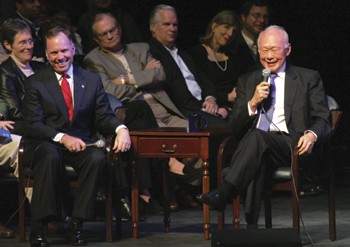
Lee Kuan Yew, the first Prime Minister of Singapore (right) and Brad Cheves share a laugh on stage during the question and answer session of last night’s Tate Lecture.
On Thursday, the Willis M. Tate Distinguished Lecture Series presented Lee Kuan Yew, the first prime minister of the Republic of Singapore and one of that country’s most influential politicians.
SMU President R. Gerald Turner voiced his appreciation to Lee while introducing him.
“The three decades Lee served as Prime Minster, Singapore has transformed from a developing country into an economic powerhouse.
I am privileged to share in his wisdom as he expands our knowledge of the rise of the Asian world,” said Turner.
Lee has earned a memorable place in history for his leadership role in negotiating Singapore’s independence from Britain in 1958. He was then elected the first prime minister of the Republic of Singapore in 1959, and won re-election seven times before his resignation in 1990.
Due to Lee’s leadership, Singapore became an economic center of international trade and a financial and industrial source of power, despite its small size and limited natural resources. Lee voiced his appreciation of the U.S. contributing to Singapore’s developing economy.
There are more than 2,000 U.S. companies based in Singapore currently.
According to a press release from Gary Shultz, since stepping down from office Lee has remained one of the most influential politicians in Singapore.
Lee currently holds the position created especially for him, the advisory and consultative post of minister mentor, under his son Lee Hsien Loong, who became the nation’s third prime minister in 2004.
Born in Singapore, Lee received a law degree with honors in 1949 from Cambridge University in England and was admitted to the English bar in 1950.
After his return to his home in Singapore, he became a popular nationalist and assisted in founding the People’s Action Party in 1954. He led the party in its general election victory in 1959 and subsequently became prime minister.
Throughout his lecture Lee praised the United States for its involvement in the development of Asia and commended America for having one of the most dynamic economies in the world.
He said that “although there was much bloodshed in all of the American wars in Asia, America has revitalized Japan, rebuilt South Korea, and transformed Vietnam.”
Lee voiced his support of the Bush administration and its decision to enter Iraq and not abandon the U.S. initiative in Iraq “prematurely.”
Lee said, “If the U.S. was to leave Iraq early, the battle could go to American soil and harm Americans as well as America’s friends and allies.”
Lee said he feared that this could happen because of the 4-year term central to the American election cycle.
His recommendations for what policy changes should happen in Iraq include his belief that democracy is possible, but must start with, educating the young – especially women – providing women with equal job opportunities, and building a civic society that is necessary for a functioning democracy.
Junior Elizabeth Barnwell said, “It was interesting to hear the perspective of an international leader on the decisions of American policy in Iraq. It was great to see that a lot of SMU students are interested in foreign affairs.”









